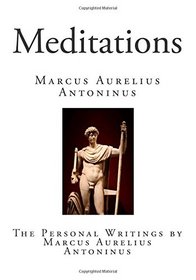Search -
Meditations: The Personal Writings by Marcus Aurelius Antoninus (The Personal Writings by Marcus Aurelius Antoninus - The Roman Emperor)
Meditations The Personal Writings by Marcus Aurelius Antoninus - The Personal Writings by Marcus Aurelius Antoninus - The Roman Emperor
Author:
Meditations by Marcus Aurelius Antoninus - The Personal Writings by Marcus Aurelius. The Roman Emperor. With Appendix, Notes and Glossary. Meditations is a series of personal writings by Marcus Aurelius, Roman Emperor 161?180 CE, setting forth his ideas on Stoic philosophy. Marcus Aurelius wrote the 12 books of t... more »
Author:
Meditations by Marcus Aurelius Antoninus - The Personal Writings by Marcus Aurelius. The Roman Emperor. With Appendix, Notes and Glossary. Meditations is a series of personal writings by Marcus Aurelius, Roman Emperor 161?180 CE, setting forth his ideas on Stoic philosophy. Marcus Aurelius wrote the 12 books of t... more »
ISBN-13: 9781501096143
ISBN-10: 1501096141
Publication Date: 9/7/2014
Pages: 148
Rating: ?
ISBN-10: 1501096141
Publication Date: 9/7/2014
Pages: 148
Rating: ?
0 stars, based on 0 rating
Publisher: CreateSpace Independent Publishing Platform
Book Type: Paperback
Members Wishing: 9
Reviews: Amazon | Write a Review
Book Type: Paperback
Members Wishing: 9
Reviews: Amazon | Write a Review
Genres:




